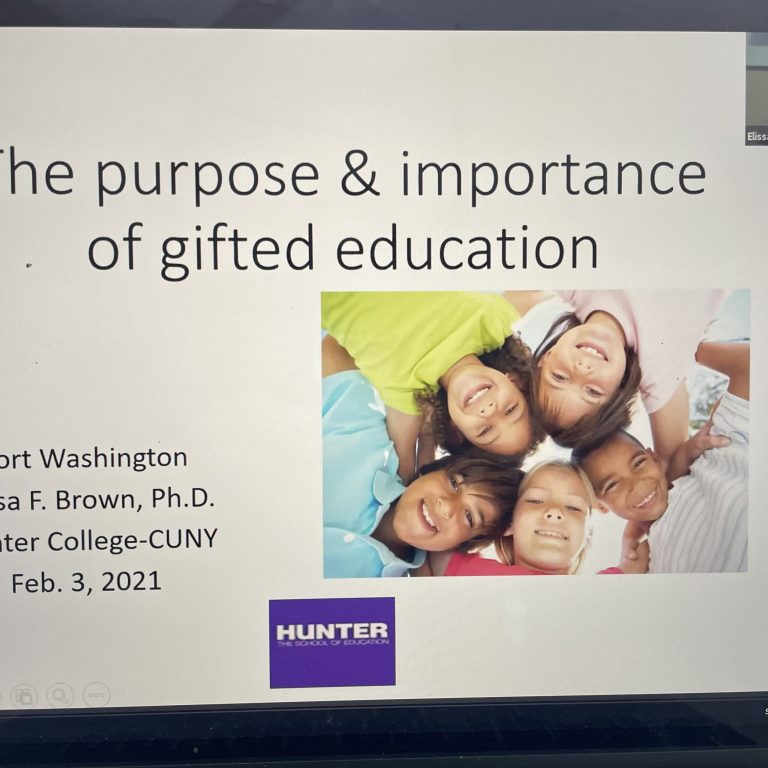
On the evening of Wednesday, Feb. 3, AGATE of Port Washington hosted its annual guest speaker. This year’s speaker was Elissa Brown, director of the Hunter College Center for Gifted Studies, who addressed “The Purpose and Importance of Gifted Education” for an audience that included local parents, Board of Education members, educators and administrators. T
The discussion was moderated by AGATE co-presidents Nanette Melkonian and Kim Keiserman, while AGATE board member Analia Quispe provided Spanish language interpretation through a free conference line.
Brown devoted much of the presentation to challenging assumptions and stereotypes about giftedness and exploring what the scholarly research reveals about the personality and intellectual characteristics of gifted learners.
In particular, she emphasized personality characteristics such as introversion, a keen sense of justice and a propensity to question authority, and intellectual characteristics such as a rapid learning rate, divergent thinking and a need for precision, logic and stimulation.
She stressed the importance of teacher training in recognizing these characteristics and responding to the behaviors and special needs that arise from them, noting that just because children are gifted doesn’t mean that they are exceptionally mature, able to excel in every area, able to work independently, able to cope with multiple stressors or able to make long-term goals.
Brown provided an overview of the national landscape on gifted education, pointing out that there is no federal definition of giftedness, no federal mandate to meet the needs of gifted children and no federal funding for gifted programs. In the absence of federal policy on gifted students, states are responsible for this area of education; but only four states have mandates to identify and serve gifted students along with the funding to fulfill these mandates.
Twenty-five states have mandates to either identify or serve gifted students while ten have mandates to do both but no funding, and eight have no mandates or funding. New York is one of the eight, and as a result, gifted education varies widely from district to district: Only 17.4 percent of New York State’s school districts report offering some form of gifted programming and only 1.7 percent of New York’s students are identified and enrolled in gifted programs, compared to 6.7 percent of students nationally.
Brown pointed out the irony of New York’s position because New York state law, section 4452, defines gifted pupils in terms that emphasize the necessity of specialized educational programs or services, stating that “…the term ‘gifted pupils’ shall mean those pupils who show evidence of high performance capability and exceptional potential in areas such as general intellectual ability, special academic aptitude and outstanding ability in visual and performing arts. Such definition shall include those pupils who require educational programs or services beyond those normally provided by the regular school in order to realize their full potential.”
AGATE of Port Washington is a home-school association that works with parents, teachers, administrators and other organizations to advocate for the unique needs of diverse gifted students and other advanced learners from pre-kindergarten through graduation.
Since the early 1990s, AGATE has advocated for an appropriate and challenging education designed to help all students achieve their fullest potential. AGATE’s board is grateful to Dr. Brown for leading such an informative and thought-provoking discussion and recommending resources for learning more about the purpose and importance of gifted education.
To find a recording of this event, and to learn more about AGATE of Port Washington, please go to https://agatepw.com.






